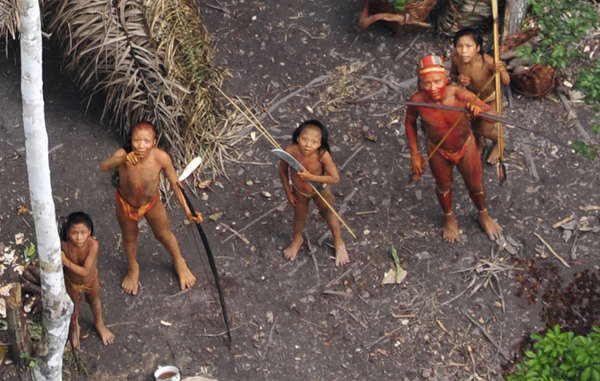Green, Resources - Miners Suspected In Indigenous Massacre
Illegal gold miners allegedly murdered members of a largely uncontacted indigenous group in Brazil, and bragged about the crime at a bar in the nearest town. So far, two miners have been arrested.
Although separated from the rest of the developed world, members of this tribe gained brief fame back in 2010 when sociologists caught images of members looking at their airplane from a clearing in the western rainforest.

The killings might have gone unnoticed if it weren't for the boasting. As many as ten tribal members - men, women and children - were gathering eggs along the River Jandiatuba in remote, far western Brazil last month, when the confrontation with the outsiders took place. The Brazilian indigenous affairs agency Funai and the rights group Survival International say the miners even showed off a hand-carved paddle taken from a tribal member as proof of their crime - but they probably weren't aware that someone in the bar was recording the conversation.
"It was crude bar talk," said Leila Silvia Burger Sotto-Maior, Funai's coordinator for uncontacted and recently contacted tribes. "They even bragged about cutting up the bodies and throwing them in the river," she said referring to the river in the Javari Valley, in the country's remote west.
It is believed that there are only 50 or so members of this tribe, meaning that ten murders is about one-fifth of its population.
Brazil's unelected president Michel Temer slashed Funai's budget, and the agency has had to close several of its field offices in the rainforest. Survival International described Temer's government as "fiercely anti-Indian, and has close ties to the country's powerful and anti-indigenous agribusiness lobby"; the group also says Temer bears heavy responsibility for the murders.
"The slashing of Funai's funds has left dozens of uncontacted tribes defenseless against thousands of invaders - gold miners, ranchers and loggers - who are desperate to steal and ransack their lands," said Stephen Corry, director of Survival International. "All these tribes should have had their lands properly recognized and protected years ago - the government's open support for those who want to open up indigenous territories is utterly shameful, and is setting indigenous rights in Brazil back decades," he added.







 Create PDF
Create PDF Print
Print Email to friend
Email to friend